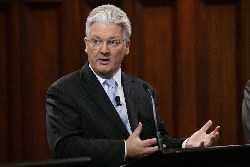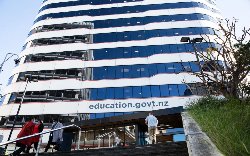Nepal: Holding Local Elections within Six Months Impossible
Nepal: Holding Local Elections within Six Months Impossible
by Siddhi B Ranjitkar
March 17,
2014
The current coalition government of NC and CPN-UML has presented the price-rise in milk, and petroleum products, as one of the gifts to the voters that had voted them to power in particular and the Nepalis in general, and hit hard the party that had helped the NC and the CPN-UML to win the elections hunting its cadres for the crimes committed during the people’s war. Prime Minister Sushil Koirala had had serious talks with the senior leaders of the CPN-UML on holding the local elections. Deputy prime minister holding the portfolio of the home ministry had said in public that holding the local elections in six months was not possible. UCPN-Maoist and CPN-Maoist had opposed the local elections stating such elections were unconstitutional, and such elections would go against the federalism. Nepalis had started off complaining about not receiving the services from the State agencies without paying rent to the officials.
The State-owned Dairy Development Corporation (DDC) increased the prices of milk effective on March 12, 2014. The price-rise of whole milk and of two percent regular milk was eight rupees per liter and six rupees per liter respectively. Consequently, the whole milk cost Rs 68 per liter and the regular two-percent milk cost Rs 56 per liter. Retailers add two rupees per liter. Practically, consumers have to pay additional Rs 10 per liter of the whole milk, and Rs 8 per liter of the regular milk after the price-rise. Not even a month had passed since Sushil Koirala became the prime minister, the government of NC and CPN-UML presented this price-rise of milk as one of the gifts to the Nepalis in general and the voters in particular.
Another gift, the government presented to the Nepalis in general and the voters in particular was the price-rise in the petroleum products effective on March 14, 2014. Nepal Oil Corporation (NOC) increased the price of petrol from Rs 130 to Rs 140 per liter, and of diesel and kerosene from Rs 103 to Rs 109 per liter. Such price-rise in the petroleum products would fuel the inflation, and would hit hard particularly the low-income consumers.
Speaking to the anchor of the Radio Nepal morning program called ‘antar-sambad’ on March 16, 2014, the secretary to the ministry of commerce and supplies said that the price-rise in milk and petroleum products were overdue, as NOC needed to buy the products at high prices and then sell at low prices. He said that the previous government headed by the Chief Justice formed entirely for holding elections to a new constituent assembly (CA) did not increase the prices of these commodities fearing the violence protests from the people. So, the current government had to enforce the price-rise in milk and petroleum products without delay, as both DDC and NOC had been incurring a great loss. The secretary also urged the students protesting against the price-rise in milk and petroleum products not to do so.
The CPN-Maoist has demanded the government to roll back the price-rise in milk and petroleum products, and the party warned of the street protests if it were not done so immediately. The statement released by the Joint Peoples' Committee Convener Dev Prasad Gurung said that the government needed to stop the irregularities in the management of the NOC and the leakage of petroleum products rather than increasing the prices. (Source: Gorkhapatraonline.com, March 15, 2014)
The Maoist leaders complained about the government hunting the Maoist cadres for the criminal charges committed during the people’s war. This was the gift, the government of the NC and the CPN-UML presented to the CPN-Maoist for helping them to win the elections. Cadres of the CPN-Maoist did everything possible to ensure the defeat of the candidates of the UCPN-Maoist. Consequently, the NC and the CPN-UML emerged as the winners in the elections to the CA held on November 19, 2013. The coalition government of NC and CPN-UML had been tracking down the Maoist cadres for their criminal activities during the people’s war. The government had been doing it in appreciation of the Maoists’ help in winning the elections.
Speaking to the anchor of the Radio Nepal morning program called ‘antar-sambad’ on March 15, 2014, Vice-chairman of CPN-Maoist CP Gajurel said that the government had started off going after the Maoist cadres charging them with the criminal activities committed during the people’s war; someone had been already put in the jail in terai. He also said that the local elections were unconstitutional without a new constitution; so, his party opposed the holding of the local elections. Vice-chairman Gajurel also refuted the newspaper reporting that the UCPN-Maoist and the CPN-Maoist were going to merge. He said that both the parties had agreed on working together to fight against the government pursuing the Maoist cadres, and the holding of the local elections.
Senior leader of CPN-UML Madhav Kumar Nepal with his senior colleague Bharat Mohan Adhikari went to see Prime Minister Sushil Koirala at the Baluwatar official residence of Prime Minister on the morning of March 14, 2014, and they held discussions on holding the local elections within mid-June this year. Talking to the reporters after the meeting with the prime minister, senior leader Nepal said, "We the two parties discussed holding local elections within mid-June this year at any cost. We also held constructive talks on removing the delay seen in constitution writing." Concerning the UCPN-Maoist and the CPN-Maoist not taking part in the local elections to be announced for mid-June this year, leader Nepal, also the former Prime Minister, said that that was a 'product of the mentality of loss (defeat in the elections)'. "No any election can be held in the coming four years as it will take time to make arrangements for federalizing the country after the promulgation of a new constitution within a year," he explained. (Source: RSS news on Gorkhapatraonline.com, March 15, 2014)
Speaking at the opening ceremony of the fifth convention of the CPN-UML of Dolpa in Dolpa on March 14, 2014, deputy prime minister holding the portfolio of the home ministry Bamdev Gautam said that holding the local elections within six months was impossible, as holding the local elections within the remaining three months was not possible, and then the rainy season set in. (Source: gorkhapatra, March 15, 2014)
Speaking to the reporters after the opening of the district office of the Election Commission in Taplejung on March 17, 2014, Chief Election Commissioner Nilkantha Uprety said that the Election Commission could hold the local elections in Jestha (May-June) provided the political parties would make a decision on it by March 24, 2014. (Source: gorkhapatra, March 18, 2014)
At a news conference held at the headquarters of the CPN-Maoist at Buddhanagar on March 13, 2014, Chairman of CPN-Maoist Mohan Vaidhya said that his party could be unified with the UCPN-Maoist if the UCPN-Maoist were to correct its future course of actions adopted at the Hetauda convention. Chairman Vaidhya said that both the parties had some common contemporary key issues and that there was the possibility of unification if the future course of actions of the UCPN-Maoist were compatible with his party. Referring to the differences between the two parties, he said that the UCPN-Maoist had been seeking the political solution through the CA while the CPN-Maoist was from outside the CA. He suggested the UCPN-Maoist to come out of the CA, as the UCPN-Maoist could not play any important role in the CA. (Source: Gorkhapatraonline.com, March 15, 2014)
In a joint press statement released on March 13, 2014 after the meeting between the top leaders of the two parties, the UCPN-Maoist and the CPN-Maoist said that the local elections should be held only after promulgating a new constitution. They drew the attention of the government to give the first priority to restructuring of the State following the provision made in the Article 138 of the Interim Constitution of Nepal of 2007. Concerning the statement made by some ministers and leaders of the political parties in the government on holding local polls in May of this year, Chairman of UCPN-Maoist Prachanda and Chairman of CPN-Maoist Mohan Vaidhya jointly said that making preparations for holding local elections had overshadowed the crafting of a new constitution. They strongly urged all the concerned agencies not to hold local elections without the promulgation of a new constitution. (Source: Gorkhapatraonline.com, March 15, 2014)
Chairman of UCPN-Maoist Prachanda and Chairman of CPN-Maoist Mohan Vaidhya jointly said that they had been concerned with the arrest of cadres and leaders of both parties by the State charging them with the cases of the people’s war, going against the norms and spirit of the Comprehensive Peace Accord reached between the government and the Maoists. They demanded that the government set up the Commission on Investigation into Disappeared Persons and the Truth and Reconciliation Commission following the Comprehensive Peace Accord. They also demanded the government immediately release their arrested cadres and leaders. (Source: Gorkhapatraonline.com, March 15, 2014)
Prime Minister Sushil Koirala returned $650 to the government out of the total money he had taken for visiting Myanmar to attend the BIMSTC summit recently. This was the leftover money. He did not say the amount of the money he had taken. He passed the money on to the Chief Secretary who in turn passed it on to the ministry of foreign affairs. The money would go back to the state treasury. (Source: gorkhapatra, March 15, 2014)
Prime Minister Sushil Koirala had sincerely returned the leftover money to the State treasury. He had at least saved $650 of the taxpayers’ money. However, the prime minister had done nothing to stop the official seeking rent for delivery of the regular services to the common folks. People had been complaining about the need for paying bribe not under the counter but over the counter for any services they sought from the State agencies according to the local news reports. The rent seeking for delivery of the State services had been rampant during the government of the NC in the previous regime, too. The weakness of the NC and the CPN-UML government would be not being able to stop the unbridled corruption.
The price-rise in milk and the petroleum products was the first step of the current government; many more steps would certainly follow to punish the voters that had voted for these parties. Ethnic people, Madheshis and underprivileged people would face the challenges of getting their voices heard, and of getting their rights to have an equal representation in the State agencies. NC and CPN-UML leaders had made their mind-set to enforce the provinces and the system of governance through the two-thirds majority rather than building a consensus on these issues. In doing so, the NC and the CPN-UML had invited another people’s movement that the CPN-Maoist had wanted.
ENDS


 Peter Dunne: Luxon Gets Out His Butcher's Knife - Briefly
Peter Dunne: Luxon Gets Out His Butcher's Knife - Briefly Binoy Kampmark: Warring Against Encryption, Australia Is Coming For Your Communications
Binoy Kampmark: Warring Against Encryption, Australia Is Coming For Your Communications Gordon Campbell: On Fast Track Powers, Media Woes And The Tiktok Ban
Gordon Campbell: On Fast Track Powers, Media Woes And The Tiktok Ban Binoy Kampmark: Censorship Wars, Elon Musk, Safety Commissioners And Violent Content
Binoy Kampmark: Censorship Wars, Elon Musk, Safety Commissioners And Violent Content Gordon Campbell: On The Public Sector Carnage, And Misogyny As Terrorism
Gordon Campbell: On The Public Sector Carnage, And Misogyny As Terrorism Ramzy Baroud: NATO’s Never-ending War: The 75-Year-Old Bully Is Faltering
Ramzy Baroud: NATO’s Never-ending War: The 75-Year-Old Bully Is Faltering